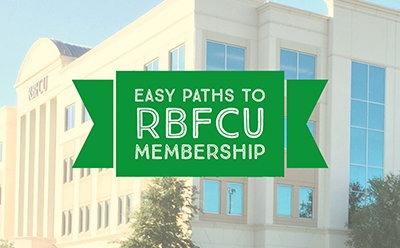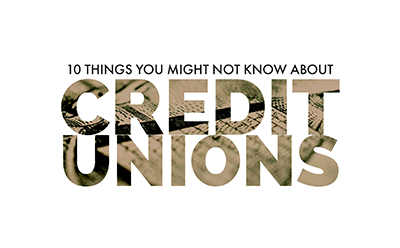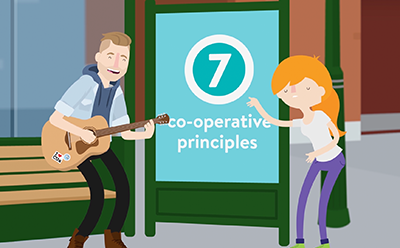The Credit Union Advantage
What is a credit union, and what makes it different from a bank?
What is a credit union?
Credit unions are not-for-profit cooperatives, owned by their members who save and borrow there. The philosophy of the credit union movement is “not for profit, not for charity, but for service.” This philosophy dictates how a credit union differs from other financial institutions. When you open your account, you become an owner of your credit union.
Credit unions are focused on people, not profits. They operate by a “people helping people” philosophy that is hard to find at many other financial institutions.
This is reflected in a credit union’s board of directors — a group elected from the membership who volunteer their time to set the credit union’s policies. As a credit union member, you can nominate someone for the board, or run for office yourself! In selecting the board members, each credit union member receives one vote — regardless of the amount of money the member has with the credit union. You may also choose to volunteer to serve on various credit union committees.

What is the difference between banks and credit unions?
Like banks, credit unions accept deposits and make loans — but that’s where the similarities end.
Banks are owned by groups of shareholders who are interested in earning a healthy return on their investments. Credit unions are not-for-profit financial cooperatives, owned and controlled by the people — the members — who use their services. Any excess earnings are returned to credit union members in the form of higher savings rates, lower loan rates, fewer fees, and expanded services.
How are credit unions different from banks?
Credit unions ...
Banks ...
Credit unions ...
... cannot serve the general public; instead people must qualify for membership. Membership eligibility can be based on where you work, worship, live, or go to school. If you’re a member of other social groups or organizations, that may qualify you for membership too!
Banks ...
… let anyone become a customer.
Credit unions ...
... are member-owned. Every member is equal, regardless of financial investment, and carries one vote in the democratic processes that guide the credit union.
Banks ...
... are owned by shareholders. The more shares you can purchase, the more of the bank you can own, and the more influence you have.
Credit unions ...
… allow their members to vote on how the credit union is run. If you have an account at a credit union, you have a share in it.
Banks ...
… don’t allow their customers to have a say in how the bank is run.
Credit unions ...
... are not-for-profit cooperatives. Earnings are returned to their members — anyone with a share account — in the form of lower interest rates on loans and higher interest rates on deposit accounts.
Banks ...
... are for-profit. A bank’s earnings are distributed to its executives and those who own shares or stock in the company. Customers rarely see the effects of profit.
Credit unions ...
... are governed by boards of directors. Board members set the policies and govern the affairs of the credit union. More importantly, they are elected from the membership, and they are volunteers who receive no compensation for their work.
Banks ...
... are run by paid board members or executives who are hired, often from outside the organization and even from outside the banking clientele.
Credit unions ...
... are insured up to $250,000 by the National Credit Union Administration (NCUA).
Banks ...
… are insured up to $250,000 by the Federal Deposit Insurance Corporation (FDIC).
Credit unions ...
... tend to be local and have fewer branches, but thanks to ATM network sharing, you can use in-network ATMs free of charge at other credit unions and convenience stores.
Banks ...
… are present in most major cities, but if you need to use another bank’s ATM, get ready to pay a higher service charge.
What gives credit unions an advantage over banks?
Volunteer boards
Every credit union is governed by a board of directors, elected by and from the credit union’s membership. Board members serve voluntarily and receive no compensation.
Volunteer boards
Every credit union is governed by a board of directors, elected by and from the credit union’s membership. Board members serve voluntarily and receive no compensation.
Separating Fact from Fiction: 4 Credit Union Myths
Some people mistakenly believe that credit unions are limited, compared to big banks. Even though there are over 5,000 credit unions in the United States, misconceptions about their structure and services still exist. We address four persistent credit union myths below.
Myth #1: “Credit unions are basically banks with fewer services”
Reality: Credit unions offer all the same services as big banks: credit, debit, savings, loans and more. Thanks to innovations in online banking, financial institutions can be big on service — even when they’re small in size.
It pays to be a member. As a member, you own a share of your credit union and share in its success through better interest rates and fewer fees.
Myth #2: “It’s harder to access your money when you bank at a credit union”
Reality: Credit unions form a nationwide ATM network to increase accessibility to your finances. Online banking features and top customer service add to the convenience.
Myth #3: “Credit union deposits aren’t insured”
Reality: Credit union deposits are insured — they have a federal or state insurance fund that keeps your money safe.
Did you know? Deposits at all federal credit unions and most state-chartered credit unions are covered by the National Credit Union Share Insurance Fund (NCUSIF).
Myth #4: “It’s too hard to switch to a credit union”
Reality: Making the switch from a bank to a credit union is easier than you might think. Some credit unions even offer “switch kits,” which contain all of the paperwork — including direct deposit and bill pay — you need in one convenient package.
Source: It’s a Money Thing
Making the switch: Follow these steps to ensure a smooth transition
Check your eligibility.
Fill out some forms.
Transfer your funds.
Close your previous account.
Source: It’s a Money Thing
The 7 Cooperative Principles:
How do they shape my credit union experience?
Credit unions put their values into practice by following these seven co-operative principles. This sets credit unions apart from all other financial institutions, strengthens the community and benefits you too!
Volunteer boards
Every credit union is governed by a board of directors, elected by and from the credit union’s membership. Board members serve voluntarily and receive no compensation.
Volunteer boards
Every credit union is governed by a board of directors, elected by and from the credit union’s membership. Board members serve voluntarily and receive no compensation.
Source: It’s a Money Thing










